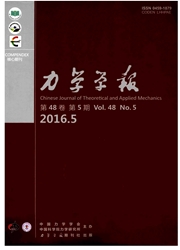

 中文摘要:
中文摘要:
在采矿工程、地下交通工程和水利水电工程等岩体开挖工程中,爆破法仍是一种主要的破岩方法。实际天然岩体中存在的裂隙、节理等不连续面和所处的地应力场环境,都会对爆破荷载传播过程和最终的破碎效果产生重要影响。本文把岩石爆破视为爆炸应力波动态作用和爆生气体压力准静态作用两个独立的先后作用过程,同时考虑初始应力场的静态作用,建立岩石爆破的力学模型。基于渗流方程描述爆生气体在爆生裂纹中的传播过程,进而基于流固耦合理论实现爆生气体准静态压力对裂纹尖端的力学作用。爆炸应力波主要在孔周引起压碎区和径向微裂纹区,随后爆生气体压力楔入径向裂纹尖端,促使裂纹进一步扩展,形成径向主裂纹。数值模型可以再现孔周压碎区、径向微裂纹区、径向主裂纹区萌生、扩展的完整演化过程。针对不同节理角度和地应力条件下岩石双孔爆破过程的数值模拟结果表明,初始地应力场的压应力作用不利于爆生裂纹的萌生与扩展,但节理的存在对裂纹的扩展具有明显的导向和促进作用,有利于爆生裂纹沿节理面方向的扩展。
 英文摘要:
英文摘要:
Drilling and blasting is still the most widely used method for rock breaking in mining engineering, underground tra-c engineering, hydro-power engineering, etc. The in-situ stress field and structural plane such as joint and fault all have great impacts on blasting load propagation and rock fragmentation. In the present model, a mechanical model for rock blasting is established with consideration of in-situ stress field, in which rock blasting duration is considered as two consecutive stages, i.e. firstly the dynamic stage caused by the stress wave and then the static stage caused by explosion gas pressure. The seepage equation is used to describe the explosion gas propagation in cracks and the mechanical effect of quasi-static pressure of explosion gas near the crack tip is reflected based on seepage-mechanical coupling theory. Blasting stress wave mainly initiates crush zone and radial microcrack zone, while explosion gas pressure can then squeeze into the cracks and lead to crack extension. The proposed model can reproduce the whole process of initiation and extension of crush zone and radial cracks. Numerical simulations on two-hole blasting of rock under different joint angles and in-situ stress conditions are carried out and it indicates that in-situ stress conditions would go against the initiation and propagation of blasting induced crack, while the existing joint would play a positive role on crack extension as well as a guide role on crack propagation along joint orientation.
 同期刊论文项目
同期刊论文项目
 同项目期刊论文
同项目期刊论文
 期刊信息
期刊信息
